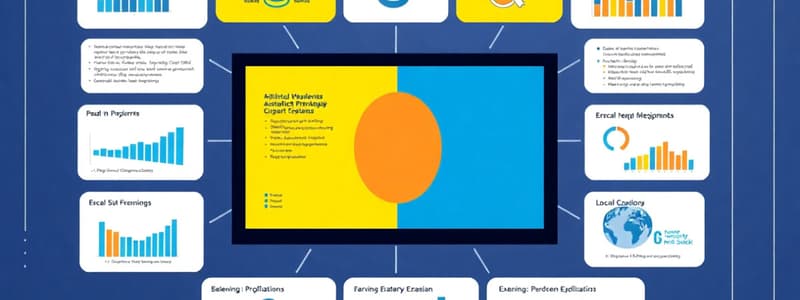Podcast
Questions and Answers
Which component is NOT part of the monitoring process?
Which component is NOT part of the monitoring process?
- Corrective Actions
- Standards & Benchmarks
- Management Information System
- Communication Tools (correct)
Engineered standards are based on qualitative analysis.
Engineered standards are based on qualitative analysis.
False (B)
Name one advantage of using historical standards.
Name one advantage of using historical standards.
Readily available
A key characteristic of an effective Management Information System is its ability to provide __________.
A key characteristic of an effective Management Information System is its ability to provide __________.
What is a major disadvantage of historical standards?
What is a major disadvantage of historical standards?
Management Information Systems must be complex to be effective.
Management Information Systems must be complex to be effective.
What do standards measure in the monitoring process?
What do standards measure in the monitoring process?
Which of the following is NOT a key characteristic of an effective Management Information System?
Which of the following is NOT a key characteristic of an effective Management Information System?
Engineered standards are based on qualitative analysis.
Engineered standards are based on qualitative analysis.
What types of standards are primarily discussed in the monitoring process?
What types of standards are primarily discussed in the monitoring process?
An effective Management Information System should be characterized by __________.
An effective Management Information System should be characterized by __________.
What is one advantage of using industry benchmarks over historical standards?
What is one advantage of using industry benchmarks over historical standards?
Historical standards can help perpetuate outdated practices.
Historical standards can help perpetuate outdated practices.
What are the four components of the monitoring process?
What are the four components of the monitoring process?
Flashcards
Monitoring Process
Monitoring Process
Evaluating performance, identifying deviations, and ensuring effective management.
Management Information System (MIS)
Management Information System (MIS)
A system that gathers and presents data for measuring performance.
Standards
Standards
Metrics used to measure performance, established during planning.
Historical Standards
Historical Standards
Signup and view all the flashcards
Engineered Standards
Engineered Standards
Signup and view all the flashcards
Assessing Performance
Assessing Performance
Signup and view all the flashcards
Simplicity (MIS)
Simplicity (MIS)
Signup and view all the flashcards
Accessibility (MIS)
Accessibility (MIS)
Signup and view all the flashcards
Merge Capability (MIS)
Merge Capability (MIS)
Signup and view all the flashcards
Adaptability (MIS)
Adaptability (MIS)
Signup and view all the flashcards
Historical Standard - Advantage
Historical Standard - Advantage
Signup and view all the flashcards
Historical Standard - Disadvantage
Historical Standard - Disadvantage
Signup and view all the flashcards
Engineered Standard - Example
Engineered Standard - Example
Signup and view all the flashcards
Study Notes
Monitoring Process
- Monitoring evaluates performance and results, identifies deviations, and ensures effective management.
- It includes management information systems, standards and benchmarks, results analysis, and corrective actions.
Management Information System (MIS)
- MIS gathers and presents data to measure performance.
- Important characteristics of an effective MIS:
- Simplicity: Easy-to-understand and compare data.
- Accessibility: Quick and easy access to information.
- Merge Capability: Ability to combine internal and external data for comprehensive analysis.
- Adaptability: Flexible enough to handle changes in strategy or market conditions.
Standards & Benchmarks
- Standards measure performance and are established during planning and organizing.
- Two types of standards:
- Historical Standards: Derived from internal or external sources. Advantages include readily available data and basis on past performance. Disadvantages might include perpetuating outdated practices.
- Engineered Standards: Based on a quantitative analysis of work situations.
Historical Standards
- Can be based on internal or external data.
- Advantages: Easily accessible and based on past performance.
- Disadvantages: Can perpetuate outdated practices.
- Industry benchmarks offer objectivity and remove internal bias.
Engineered Standards
- Based on a quantitative analysis of work situations. For example, premium transactions per employee for administrative efficiency.
- Help assess individual or departmental output.
Assessing Performance
- Compare actual performance against established standards.
Overview of Monitoring Process
- Monitoring is an assessment of results that helps maintain positive outcomes and address deviations.
- It's more than just inspection; it influences activities and ensures effective management.
- Key components of monitoring include: Management Information System, Standards & Benchmarks, Results, and Corrective Actions.
Component 1: Management Information System (MIS)
- MIS gathers and presents data to measure performance.
- Effective MIS should be:
- Simple: easy to compare and understand.
- Accessible: information should be quick and easy to retrieve.
- Merge Capability: Ability to combine internal and external data for comprehensive analysis.
- Adaptable: Flexible enough to handle changes in strategy or market conditions.
Component 2: Standards & Benchmarks
- Standards are used to measure performance and are established during planning and organizing stages.
- Two types of standards:
- Historical Standards: Based on past performance, either internal or external.
- Advantages: readily available and based on experience.
- Disadvantages: Can perpetuate outdated practices.
- Engineered Standards : Based on a quantitative analysis of work situations.
- Example: Premium transactions per employee for monitoring administrative efficiency
- Helps assess individual or departmental output.
- Historical Standards: Based on past performance, either internal or external.
Historical Standards
- Derived from internal or external sources.
- Advantages: Easily accessible and based on past performance.
- Disadvantages: May perpetuate outdated practices.
- Industry benchmarks provide objective data, reducing internal bias.
Engineered Standards
- Developed through quantitative analysis of work situations.
- Example: Premium transactions per employee for monitoring administrative efficiency.
- Help assess individual or departmental output.
- Used to compare actual performance against established standards.
Studying That Suits You
Use AI to generate personalized quizzes and flashcards to suit your learning preferences.




